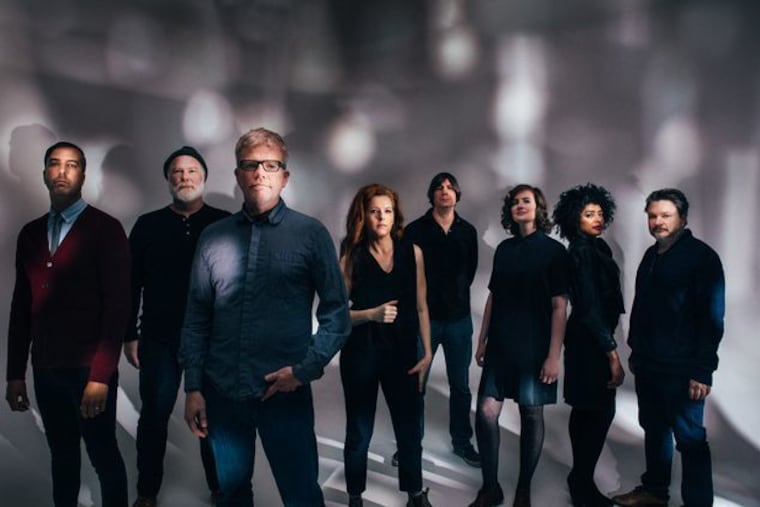The New Pornographers head for Philly, with strings
The Vancouver collective's recently released eighth album, 'In the Morse Code of Brake Lights,' highlights the newest of the eight Pornographers, violinist Simi Stone. They appear Friday at Union Transfer.

It feels safe to nominate the New Pornographers as power pop’s finest band.
The Vancouver group’s first album, 2000’s aggressively blissful Mass Romantic, seemed to come out of nowhere, and earned the indie band word-of-mouth as a “supergroup” for counting among its ranks the likes of future alt-country star Neko Case and critically acclaimed art-rocker Dan Bejar (who records solo as Destroyer).
It could have been a classic one-off. But as the New Pornographers kept going with sugar-rush Electric Version in 2003 and prog-influenced Twin Cinema two years later, it became clear this was no side project — even though the loose “collective” format made for a revolving door of musicians. The most well-known members brought their A game to buttress chief songwriter Carl Newman’s oblique, shamelessly catchy tunes.
They’ve subtly evolved with their shifting lineup: 2014’s Brill Bruisers brought more synthesizers into the mix, and 2017’s Whiteout Conditions contrasted the robotic influence of krautrock with political anxiety. The recently released eighth album, In the Morse Code of Brake Lights, is another good-to-great entry in the group’s canon and highlights the newest of the current eight Pornographers, violinist Simi Stone, on several tracks that dive and swoop with bright string arrangements.
As they prepare to play Philly’s Union Transfer at 7:30 p.m. Friday, we spoke to bandleader Newman about the new release and the impending 20th anniversary of the band’s debut album.
Mass Romantic turns 20 next year. How does that feel?
It’s such a ridiculous milestone. Twenty years? When you’re turning 30, you’re like, “Oh no, I’m turning 30, I’m getting old!” And when you turn 40, you’re like, “Who gives a ... ?” You’ve accepted your mortality — 50, 60, bring it on.
Do you have any plans for the anniversary?
I’ve got a year still. I’m trying to think about what I want to do for the actual anniversary. I don’t want to just rerelease it. All the music we’ve released … it’s not all there is. A ton of other music gets whittled down just trying to develop whatever Mass Romantic or Twin Cinema we decide to put out in the world. I thought it would be fun to go back in time and try and find…
The fragments they were built from?
Yeah! Not necessarily go like, “Hey, look at all these outtakes,” but…
How do you feel about the band always being tagged a “supergroup”?
I think the combination of people has made us what we are. You can call us what you want. Neko [Case] always had her career, which was a priority for her. [Dan] Bejar’s career as Destroyer was a priority. We’re not a full-time band. We’re a full-time band for me, but it’s a strange dynamic. Whenever I talk to Kevin [Drew] or Brendan [Canning] from Broken Social Scene, I feel like they’re the only two people who understand what my life is like. Because they had the same thing: This large band, we’re Canadians, the lineup is kind of fluid, a woman in the band became famous outside of the band. I’m kind of amazed we’re still here.
What you guys help pioneer with musical collectives seems to have become a way of life for a lot of bands.
I don’t think we had a bunch of influence on that, but people do ask me, “Why at a certain point did these bands just show up?”
Your last album, Whiteout Conditions, was marked by significant references to depression and the madness of Trump’s election. Is the new album a continuation? “You’ll Need a New Backseat Driver” mentions a “child king.”
Thematically, I think it carries on. A lot of Whiteout Conditions was an anticipation that something bad could happen... Everybody was feeling that dread, which ended up being the last three years of reality. It was inescapable. It was hard for me to write anything that felt honest and not have that be at least a subtext. The world is in a dangerous place. The apocalyptic feelings of encroaching climate change, the internet changing the way we think and interact. I try to write about love and hope, but it’s still framed by all those things.
Did you have a more strings-oriented album in mind before Simi [Stone] became an official member?
We’ve used strings before, but always in a relatively subtle way. I wanted to try using strings in an absolutely ridiculous way. Some people have written about the song “Colossus of Rhodes” like, “The strings are too jarring,” and I said, “Yes! They are!”
It feels like an intentional about-face to have this live string ensemble after pointedly using robotic krautrock rhythms on the last album.
Through the years, I’ve tried to not repeat myself too much. And with this record I thought, “This sounds like something from Twin Cinema, but maybe that’s good.” Or “that sounds like something from Electric Version, but why not?” Maybe, with time passing, I don’t feel like I have anything to prove as much. I’ve embraced what I do.
“Falling Down the Stairs of Your Smile” sounds like it could’ve been written for Electric Version, but the production and arrangement feel completely different.
You can take the same melody and chords, you can play them as a ballad, you can play them as a rock song, it’s all about arrangement. You can have a song written, but that doesn’t mean it’s done.